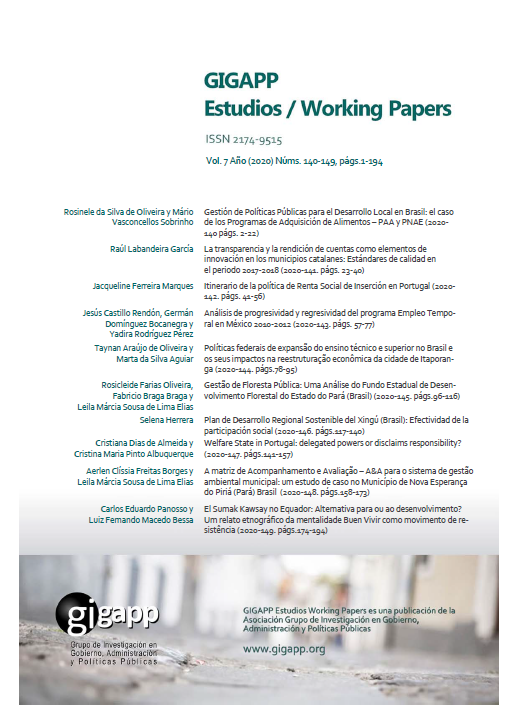Gestión de Políticas Públicas para el Desarrollo Local en Brasil
El caso de los Programas de Adquisición de Alimentos – PAA y PNAE
Abstract
The Brazilian Amazonian region is living its third generation of public policies focused on supporting family farming. These policies cohabit intergenrationally and take a broad range of policy strategies, that from stimuli of agricultural production to social innovation initiatives, which is the creation of an "institutional market" via PAA and PNAE. The concept adopted here as basis for this research is social innovation and the theory in use for this analysis is based on social capital approach. The case study and content analysis were adopted here as methods. The sample is the set of 144 local governments of the State of Pará, in Brazil. Results suggest that there is a need to policy change-succession aimed at family farming which, in turn, must have an immanently strategic character for the country, and do serve as an example for other countries, as it was pointed out by United Nations. This policy shift must be able to create social innovation with interface in various key areas of local development that directly affect life in the Para's countryside.
Downloads
References
Baccarin, José Giacomo. 2011. “Alimentação Escolar e agricultura familiar: alcance e dificuldades para implantação do Artigo 14 da Lei 11.947/2009 no Estado de São Paulo”, Congresso da SOBER, 49.
Balem, T. A. et al. (2015). The role of Rural Extension in the viability of public procurement for school meals. In: AGRICULTURE IN A URBANIZING SOCIETY: Reconnecting agriculture and food chains to societal needs, 2.
Bardin, L. (1977). Análise de Conteúdo. Lisboa: Edições 70.
Bardin, L. (2011). Análise de Conteúdo. São Paulo, Edições 70, p. 279.
Blanco, I., Cruz, H. & Martinez, R. (2016): “El papel de la innovación social frente a la crisis”, Ciudad yTe-rritorio.EstudiosTerritoriales,47(188),249-260.
Blanco, I. (2018): “¿Frente a la desigualdad social, innovación social? Lecciones teoricas, politicas meto-dologicas de una investigacion en Catalunya”. En: Barón, N. & Romero, J., Cultura territorial e inno-vación social ¿Hacia un nuevo modelo metropolitano en Europa del Sur?,21-34.
Brasil. 2003. Lei nº 10.696, de 2 de julho de 2003. Dispõe sobre a repactuação e o alongamento de dívi-das oriundas de operações de crédito rural, e dá outras providências. Diário Oficial [da] República Federativa do Brasil, Brasília, DF, 3 jul.
Brasil. Lei no. 11.326 de 24 de julho de 2006. Estabelece as diretrizes para a formulação da Política Na-cional da Agricultura Familiar e Empreendimentos Familiares Rurais. Diário Oficial da União 2006; 24 jul. 2006.
Brasil/FNDE/CD/MEC. Lei nº 11.947, de 16 de junho de 2009. Dispõe sobre o atendimento da alimenta-ção escolar e do Programa Dinheiro Direto na Escola aos alunos da educação básica; e dá outras pro-vidências. Diário Oficial {da} República Federativa do Brasil, Brasília, DF, 17 jun. 2009a.
Brasil. Lei nº 12.527, de 18 de novembro de 2011. Regula o acesso a informações previsto no inciso XXXI-II do art. 5o, no inciso II do § 3o do art. 37 e no § 2odo art. 216 da Constituição Federal; altera a Lei no 8.112, de 11 de dezembro de 1990; revoga a Lei no 11.111, de 5 de maio de 2005, e dispositivos da Lei no 8.159, de 8 de janeiro de 1991; e dá outras providências. Diário Oficial [da] República Federa-tiva do Brasil, Brasília, DF, 18 dez. 2011c.
Brasil. Ministério da Educação. Fundo Nacional de Desenvolvimento da Educação. Resolução/CD/FNDE nº 4, de 2 de abril de 2015. Altera a redação dos artigos 25 a 32 da Resolução/CD/FNDE nº 26, de 17 de junho de 2013 no âmbito do Programa Nacional de Alimentação Escolar (PNAE). Diário Oficial {da} República Federativa do Brasil, Brasília, DF, 8 abr. 2015.
Caulier-Grice, J.; Davies, A.; Patrick, R. & Norman, W. (2012): Defining social innovation. A deliverable of the project: The theoretical, empirical and policy foundations for building social innovation in Eu-rope (TEPSIE), European Commission–7th Framework Programme, Brussels: European Commission, DG Research.
Cazella, A. A; Bonnal, P; Maluf R. S. (2009). Multifuncionalidade da agricultura familiar no Brasil e o enfoque da pesquisa. In: CAZELLA, A. A., BONNAL, P. e MALUF, R. S. Agricultura familiar: multifuncionalidade e desenvolvimento territorial no Brasil. Rio de Janeiro: Mauad Editora. 301.
Coleman, J. (1988). Social Capital and the Creation of Human Capital. American Journal of Sociology, 94 Supplement, s. 52–120.
Comisión Europea (2013): Guía de la Innovación social, Regional and Urban Policy, Bruselas.
Cunha, Wellington Alvim. et al. 2017. “Efeitos dos Programas Governamentais de Aquisição de Alimen-tos para a Agricultura Familiar em Espera Feliz, MG”, Rev. Econ. Sociol. Rural. 55: 427-444.
De Schutter, Olivier. 2014. “The power of procurement: public purchasing in the service of the realizing the right to food”, Roma: FAO. 28.
Djellal, F. & Gallouj, F. (2012): “Social innovation and service innovation. In Challenge social innova-tion”. En: Franz, H.W., Hochgerner, J. & Howaldt, J. (Eds), Challenge social innovation: potentials for business, social entrepreneurship, welfare and civil society, Springer Science & BusinessMedia,119-137, DOI:10.1007/978-3-642-32879-4_8.
FAO, FIDA y PMA. (2013). El estado de la inseguridad alimentaria en el mundo 2013. Las múltiples di-mensiones de la seguridad alimentaria. Roma, FAO.
Fligstein, N. & Dauter, L. (2006). The Sociology of Markets. Institute of Industrial Relations, UC Berke-ley, Institute for Research on Labor and Employment, Working Paper Series. 33. 10.1590/S0103-49792012000300007.
García-Flores, V; Palma, L. (2019). Innovación Social: factores claves para su desarrollo en los territorios. CIRIEC-España, Revisa de Economía pública, Social y Cooperativa, 245-279. DOI:10.7203/CIRIEC-E.97.14148.
Granovetter, M. (1985). Economic action and social structure: the problem of embededdness. American Journal of Sociology, Chicago, Illinois, v. 91, n. 3, p. 481-510.
Grisa, C.; Schneider, S. (2014). Três Gerações de Políticas Públicas para a Agricultura Familiar e Formas de Interação entre Sociedade e Estado no Brasil. RESR, Piracicaba-SP, Vol. 52, Supl. 1, P. S125-S146.
Grisa, C.; Schneider, S. (Org). 2015. “Políticas públicas de desenvolvimento rural no Brasil”. Porto Alegre: Editora da UFRGS. 624.
Harris, M.& Albury, D. (2009): The innovation imperative. NESTA, London, DOI:10.13007/121.
Howaldt, J. & Schwarz, M. (2010): Social Innovation: Concepts, research fields and international trends, Sozialforschungsstelle Dortmund.
Hubert, A. (2010): Empowering people, driving change: Social innovation in the European Union, Bu-reau of European Policy Advisors.
IBGE. Instituto Brasileiro de Geografia e Estatística. Censo Agropecuário 2006. Disponível em: https://censos.ibge.gov.br/agro/2017. Acesso em: 22 dez. 2019.
Lopes, I. D. (2018). Análise da operacionalização do programa nacional de alimentação escolar em esco-las públicas de Passo Fundo/RS. Dissertação apresentada a Universidade Regional do Noroeste do Estado do Rio Grande do Sul. 151f.
Millan, R. Y Gordon, S. Capital social: una lectura de tres perspectivas clásicas. Rev. Mex. Sociol. [onli-ne]. 2004, vol.66, n.4, pp.711-747. ISSN 2594-0651.
Moyano, E. (2008), “Capital social y acción colectiva en el sector agrario”, Revista Española de Sociolog-ía, núm. 10, pp. 15-37.
Mosselaer, F. (2016): Creative Industries: Social Innovation. Academy for creative industries, DOI:10.4337/9780857930705.00014.
Moulaert, F.; Maccallum, D. & Hillier, J. (2013): Social innovation: intuition, precept, concept. The Inter-national Handbook on Social Innovation: collective action, social learning and transdisciplinary re-search, 13, DOI:10.4337/9781849809986.00011.
Mulgan, G. (2006): “The process of social innovation”, Innovations: technology, governance, globaliza-tion,1(2),145-162, DOI:10.1162/itgg.2006.1.2.145.
Nesta, (2008): Social innovation: New approaches to transforming public services. Making Innovation Flouurish, London.
OCDE (2011): Fostering Innovation to Address Social Challenges. Workshop proceedings. OECD Innova-tion Strategy, DOI: 10.1016/j.techfore. 2015.08.011.
Oosterlynck, S., Kazepov, Y., Novy, A., Cools, P., Barberis, E., Wukovitsch, F. & Leubolt, B. (2013): “The butterfly and the elephant: local social innovation, the welfare state and new poverty dynamics”, ImPRovE Methodological Paper, (13/02).
Paganini, Sérgio. 2010. “A implantação do PAA”. In: MDS. Fome Zero Uma História Brasileira. Brasília: Comunicação. 190.
Paz, E. (2015): “Un paradigma emergente: la innovación social”,3CEmpresa, 4(1),50-68.
Phills, J.A., Deiglmeier, K. & Miller, D.T. (2008): “Rediscovering social innovation”, Stanford SocialInno-vationReview,6(4),34-43.
Pot, F & Vaas, F. (2008). “Social innovation, the new challenge for Europe”, international Journal of Productivity and Performance Manegement, 57(6),468 - 473, DOI:10.1108/17410400810893400.
Putnam, Robert D. (1993) – Comunidade e Democracia – A experiência da Itália Moderna – Editora da Fundação Getúlio Vargas, Rio de Janeiro.
Rüede, D. & Lurtz, K. (2012): “Mapping the various meanings of social innovation: Toward a differentiat-ed understanding of an emerging concept”, EBS Business School Research Paper, 1203, DOI:10.2139/ssrn.2091039.
Salom-Carrasco, J., Pitarch-Garrido, M.D. & Sales-Ten, A. (2017): “Innovación social: estrategias urbanas en un contexto de cambio. El caso de la ciudad de Valencia”, CIRIEC-España, Revista de Economía Pública, Social y Cooperativa,91,31-58, DOI:10.7203/CIRIEC-E.91.10451.
Sanches, A. et al. 2014. “Familiar y compras públicas: inovaciones en la agenda da segurança alimentícia e nutricional” Em: Salcedo S, Guzmán L, editores. Agricultura familiar en América Latina e Caribe: recomendaciones de política. Santiago: Organización de las Naciones Unidas para la Alimentación y la Agricultura. 486.
Sanchís, J. R. & Campos, V. (2008): “La innovación social en la empresa. El caso de las cooperativas y de las empresas de Economía Social en España”, Economía Industrial,368,187-196.
Subirats, J. (2015): “Políticas urbanas e innovación social. Entre la coproducción y la nueva instituciona-lidad. Criterios de significatividad”. En: Subirats, J. & García Bernardos, A., Eds., Innovación social y políticas urbanas en España: experiencias significativas en las grandes ciudades,13-42.
Triches, Rozane Marcia. et al. (2013). “Aquisições públicas em Cabo Verde: desafios e potencialidades para o desenvolvimento rural”, Revista Angolana de Sociologia. 63-80.
Woolcock, M., Narayan D. (2000). Social Capital: implication for development theory, research and poli-cy. The World Bank Research Observer, 15, č. 2, s. 225–249.
World Economic Forum & Schwab Foundation For Social Entrepreneurship (2016): Social Innovation: A Guide to Achieving Corporate and Societal Value, Cologny/Geneva Switzerland.
Yepez, F (2017). La Estrategia Europea de Especialización Inteligente. Implicaciones para el Sistema Andaluz de Innovación. Tesis Doctoral, Universidad de Sevilla.
Yin, R. K. (2001). Estudo de Caso - Planejamento e métodos. 2. ed. Porto Alegre: Bookman.
Yin, R. K. (2009). Estudo de Caso – Uma estratégia de pesquisa. São Paulo, Saraiva
Copyright (c) 2020 Rosinele da Silva de Oliveira, Mario Vasconcellos Sobrinho, PhD (Autor/a)

This work is licensed under a Creative Commons Attribution-NonCommercial-ShareAlike 4.0 International License.
Those authors who have publications with this journal, accept the following terms:
a. Authors will retain their copyrights and guarantee the journal the right of first publication of their work, which will be simultaneously subject to the Creative Commons Attribution-NonCommercial-ShareAlike 4.0 International (CC BY-NC-SA Recognition License). 4.0) that allows third parties to share the work as long as its author and its first publication are indicated in this journal.
Under this open access license, readers (users) can:
- Share — copy and redistribute the material in any medium or format
- Adapt — remix, transform, and build upon the material
Under the following terms:
-
Attribution — Users must give appropriate credit, provide a link to the license, and indicate if changes were made. You may do so in any reasonable manner, but not in any way that suggests the licensor endorses you or your use.
-
NonCommercial — Users may not use the material for commercial purposes.
-
ShareAlike — If remix, transform, or build upon the material, users must distribute your contributions under the same license as the original.
- No additional restrictions — Users may not apply legal terms or technological measures that legally restrict others from doing anything the license permits.
b. Authors may adopt other non-exclusive license agreements for the distribution of the version of the published work (eg: deposit it in an institutional telematic archive or publish it in a monographic volume) provided that the initial publication in this journal is indicated.
c. Authors are allowed and recommended to disseminate their work through the Internet (e.g. in institutional telematic files or on their website) before and during the submission process, which can lead to interesting exchanges and increase citations of the published work. (See The effects of open access).



